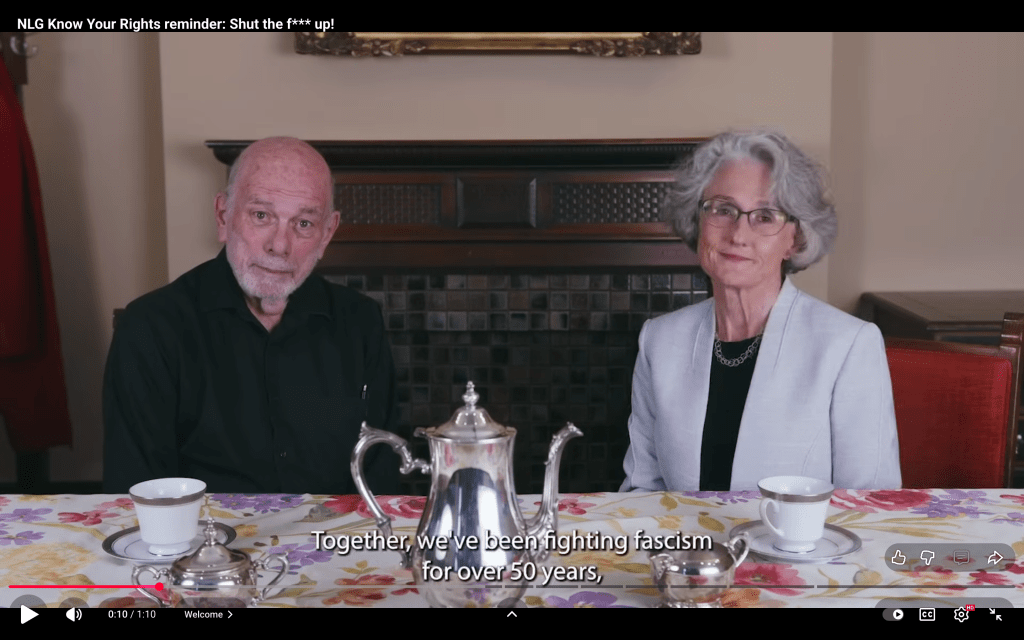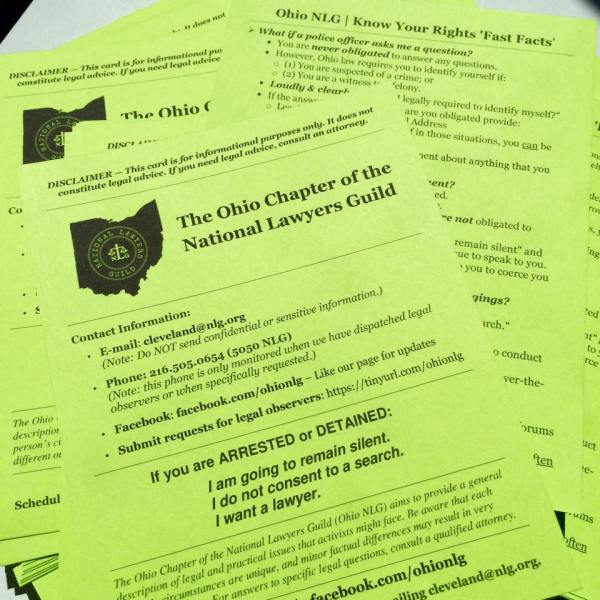
Click here to view this PSA video from the National Lawyers Guild, Detroit & MI
 See the National Lawyers Guild website here for in-depth resources to understand your rights. This includes information for protestors who are more likely to be targeted by police and booklets in Spanish, Arabic, Farsi, Bengali, and Urdu.
See the National Lawyers Guild website here for in-depth resources to understand your rights. This includes information for protestors who are more likely to be targeted by police and booklets in Spanish, Arabic, Farsi, Bengali, and Urdu.
The Ohio Chapter of the National Lawyers Guild has created a printable Ohio Know Your Rights card which is available here. However, each county also has different laws to be aware of.
To request a Know Your Rights training for your group or to request physical copies of the Ohio NLG’s KYR card, contact ohio@nlg.org.
VIRTUAL KNOW YOUR RIGHTS/RISKS TRAINING
Stay tuned for the next state-wide KYR training date.
KNOW YOUR RIGHTS ‘FAST FACTS’
The Ohio NLG aims to provide a general description of legal and practical issues that activists might face. Be aware that each person’s circumstances are unique, and minor factual differences may result in very different outcomes. For legal advice, consult a qualified attorney.
WHAT IF A POLICE OFFICER ASKS ME A QUESTION?
- You are never obligated to answer any questions.
- However, Ohio law requires you to identify yourself if:
- (1) You are suspected of a crime; or
- (2) You are a witness to a felony.
- Loudly & clearly ask, “Am I legally required to identify myself?”
- If the answer is yes, ONLY then are you obligated provide:
- Legal name, Date of Birth, and Address
- If you refuse to identify yourself in those situations, you can be arrested.
- You are not required to give a statement about anything that you witnessed or are suspected of.
- You are not required to show a photo ID unless you are driving a vehicle.
WHAT IF I AM STOPPED BY LAW ENFORCEMENT?
- Stay calm and ask if you are being detained.
- If the answer is no, you are free to leave.
- If the answer is yes, you must stay but are not obligated to answer any questions.
- Loudly & clearly state, “I am going to remain silent” and then remain silent – even if officers continue to speak to you.
- Be aware that law enforcement can lie to you to coerce you into speaking.
WHAT IF A POLICE OFFICER ASKS TO SEARCH MY BELONGINGS?
- You are not obligated to consent to a search.
- Loudly & clearly state, “I do not consent to a search.“
- However:
- If the officer has a search warrant, or in certain situations only probable cause, to conduct the search, they do not need to ask your permission.
- If you are being detained, officers may conduct a brief over-the-clothes pat down to check for weapons.
FIRST AMENDMENT ISSUES:
- Streets, sidewalks, and parks are generally considered public forums for free speech activity and generally do not require a permit.
- However, protests that block traffic or involve amplified sound often require a permit.
- Some universities have rules about use of space that may be used against protestors.
Other Know Your Rights Reference Materials – not comprehensive & not a substitute for a training!
- You Have the Right to Remain Silent (NLG): http://www.nlg.org/publications/you-have-the-right-to-remain-silent/
- If An Agent Knocks (CCR): http://ccrjustice.org/ifanagentknocks
- Tips for Trans People Dealing With Cops & Jails (SRLP): http://srlp.org/wp-content/uploads/2012/08/police-interaction-color-edit.pdf
- Electronic Surveillance Self-Defense Project (EFF): https://ssd.eff.org/
- Know Your Rights Guide (EFF): https://www.eff.org/issues/know-your-rights
- ACLU of Ohio: http://www.acluohio.org/rights-of-protesters
- Know Your Rights When Encountering Law Enforcement (ACLU): http://www.aclu.org/files/kyr/kyr_english.pdf
- Demonstration Rights for GI’s (NLG MLTF): http://nlgmltf.org/leaflets/GI_Rights_legal_demonstration.html
- Midnight Special Resources: http://www.midnightspecial.net
